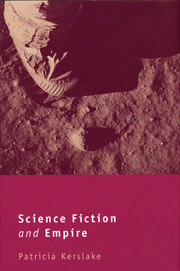Book contents
- Frontmatter
- Contents
- Introduction
- 1 The Self and Representations of the Other in Science Fiction
- 2 Resistance Is Futile: Silencing and Cultural Appropriation
- 3 The Word for World Is Forest: Metaphor and Empire in Science Fiction
- 4 Things Fall Apart: Relativity, Distance and the Periphery
- 5 Moments of Empire: Perceptions of Lasswitz and Wells
- 6 Exoticising the Future: American Greats
- 7 The Shape of Things to Come: Homo futuris and the Imperial Project
- 8 A Postcolonial Imagination: Kim Stanley Robinson's Mars
- 9 Beyond Empire: Meta-empire and Postcoloniality
- Conclusion
- Notes
- Bibliography
- Index
Conclusion
- Frontmatter
- Contents
- Introduction
- 1 The Self and Representations of the Other in Science Fiction
- 2 Resistance Is Futile: Silencing and Cultural Appropriation
- 3 The Word for World Is Forest: Metaphor and Empire in Science Fiction
- 4 Things Fall Apart: Relativity, Distance and the Periphery
- 5 Moments of Empire: Perceptions of Lasswitz and Wells
- 6 Exoticising the Future: American Greats
- 7 The Shape of Things to Come: Homo futuris and the Imperial Project
- 8 A Postcolonial Imagination: Kim Stanley Robinson's Mars
- 9 Beyond Empire: Meta-empire and Postcoloniality
- Conclusion
- Notes
- Bibliography
- Index
Summary
We are all products of the historical imperial project, though not necessarily artefacts of a deterministic history. Since almost every extant society today can look back at moments in time when it was subject to empire in one form or another, it would be foolish to assume our imaginations have not been conditioned, in some manner, by this experience. We are the products of our societies; our deepest and most private values have been informed by a historical presence or absence of political and economic power. We are not required to be proud of our societies or even to like them very much, but it is essential we become aware of who we are and why we are this way in order to ensure our future does not repeat the past mistakes of abusive power manipulation.
But to be consciously aware of and continually to remain objective in relation to all social development, even within our own small part of the global culture, is an impossible task. We are too close to the picture and can see only details, when what we really need to examine are the more general design and frame of the image. And to do this we require an inverse telescope: a tool with the ability to capture the quantum image and locate it within the greater representation, and with the additional ability to transpose images at will.
- Type
- Chapter
- Information
- Science Fiction and Empire , pp. 188 - 192Publisher: Liverpool University PressPrint publication year: 2010



